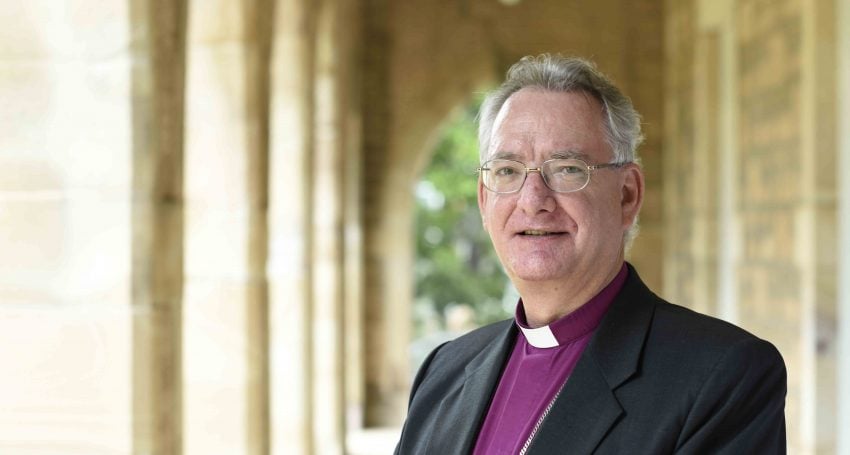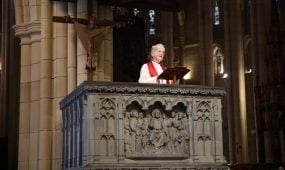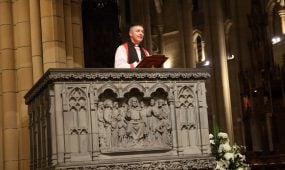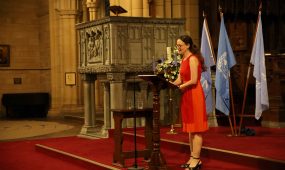Week of Prayer for Christian Unity
Homilies & Addresses
“Violent, stormy waters that threaten to overwhelm and even to extinguish life is a recurring motif in the scriptures. From the darkness covering the face of the deep and the unformed chaos in the opening verses of Genesis, to Jesus asleep in the storm-tossed boat in the gospels, untamed, raging waters evoke potent fear in human beings,” says Archbishop Phillip Aspinall in his Week of Prayer for Christian Unity homily

Acts 27.18-28.10 Paul shipwrecked on Malta
Mark 16.14-20 ‘Go into all the world…whole creation’
In the Acts story of Paul being shipwrecked on the island of Malta, the violent wind and the pounding of the storm threaten the very lives of Paul and all on board. Those aboard the ship jettison its presumably valuable cargo and all the ship’s tackle In order to secure the one thing needful, their lives.
Violent, stormy waters that threaten to overwhelm and even to extinguish life is a recurring motif in the scriptures. From the darkness covering the face of the deep and the unformed chaos in the opening verses of Genesis, to Jesus asleep in the storm-tossed boat in the gospels, untamed, raging waters evoke potent fear in human beings.
In a much gentler and more playful tone, Catholic bible scholar Michael Fallon (2001, 42-144) connects with the same root fear when he likens
‘The Church of yesterday … to a river barge. It was a large barge, with straight front and sides and with a flat bottom, well built for navigating a river and able to carry a huge cargo of churches, schools … [presbyteries, assistant priests and chaplains]. There were tennis courts [and halls and camp sites] for the…youth organisations, and mothers’ clubs and children [‘s groups]…The priest was trained to pilot the barge along the river. The river had many bends and it was not by any means easygoing. There were [crocodiles] alligators and swamps, and every now and then rapids had to be negotiated. But on the whole the river was fairly predictable. The pilot could learn his job in a…[seminary, of which there were quite a few] and carry it out well if he followed the instruction book…
Advertisement
‘Our problem is that in our time the river has hit the sea, with obvious results for the barge. There is nothing wrong with reaching the sea: that is where rivers are meant to go. But the barge which has done an excellent job in bringing us down the river is not built for breaking through waves and negotiating the open sea. The waves are coming against the flow of the river. They are pounding against the flat prow of the barge, causing it to shudder and break apart, with the loss of much that it was carrying.
‘It is understandable that those on the barge suffered and many became desperate. Some are still trying to row back upstream, but that is proving impossible. It also displays a lack of faith in the God of history and in the leadership of the Church…the modern world is where the Church wants to be. Some jumped overboard in ones and twos hoping to survive in small dinghies, bobbing up and down amid the waves. But dinghies are too small to carry the mission of the Church, and are little use in the open sea. Others, unable to face what was happening, sat in the pilot’s cabin and painted river scenes on the windows, trying to convince themselves and others that they were still in the river and that everything would be alright if everyone kept on doing what they were trained to do.
Advertisement
‘What has to happen, of course – and no one is pretending it is easy while the waves are crashing around us – is that we need to put a keel on the barge, and reshape its prow. We need to make institutional changes that are faithful to the direction and task that has been given us, but that can cope with the waves and take us through them to the sea. Jesus may appear to be asleep, but he is with us – he said he would be till the end of time. If we cry to him, he will inspire us, together, to refashion the craft so as to retain all that is good in it. We will be able to maintain direction and continue our journey in a new environment, impelled by the love of Christ, directed by his Spirit towards our Father’s home.’
Fallon’s evocative metaphor sheds light in numerous contexts.
If we think about each of our churches with their particular structures and institutions, battling to carry forward Christ’s mission in the 21st century the metaphor points to some important truths. It’s undeniably the case that we have been slow to adapt to radically changing circumstances. Although the experience of the last few months has demonstrated just how nimble we can be when we’re forced to be. There will be no rowing back upstream from this point.
Or think of the ecumenical context. The kind of organisational ecumenism that seemed to promise so much in the middle of the 20th century, seems to many to be dry, bureaucratic and uninspiring in the 21st. We struggle to populate our structures. Young people in particular are not looking to sit on committees. What they thirst for is spiritual encounter with the divine and communion with others in adventurous action to create a better future.
Or take the context of our nation. As we mark this Week of Prayer for Christian Unity, Australia is also observing National Reconciliation Week. Fallon’s river barge metaphor, presses us to ask whether we have the right vehicles to make real improvements in the lives of our Aboriginal and Torres Strait Islander brothers and sisters? Despite decades of attempts have we closed the gap at all or has our river barge hit the surf?
And we could shine Fallon’s metaphorical light in other directions as well.
One of the catchcries we’ve heard during the current pandemic is ‘We’re all in this together’. Indeed the theme for National Reconciliation Week is ‘In This together’.
This theme resonates for many because it appeals to an innate sense of solidarity. That solidarity gives rise to a moral imperative to do the right thing by each other. So, we feel moved to assist and serve others, even to sacrifice some personal freedoms and privileges in order to protect and care for the most vulnerable, putting others before ourselves.
In times of crisis this deep intuitive sense of solidarity comes to the fore.
And it actually provides a window into ultimate reality, into divine truth.
In the incarnation, in Jesus Christ, God says to humankind in the most definitive way possible ‘We’re in this together’. And being in this together God lays down God’s life for us, taking the form of a servant, even to the point of dying on a cross – to the end that all people might be reconciled to God and to each other in Christ.
We’re all in this together.
In his Confessions, St Augustine’s purpose isn’t to introduce himself to his readers. What’s he’s trying to do is introduce his readers to themselves. He tries to move his readers to see his story as their own. He wants his readers to realize that what he has discovered to be true for himself, is also true for them; that they are on the same journey as Augustine himself has taken. He wants them to see –
‘That they are made for more than the mundane, that they have hungers no thing can satisfy, that they are loved by the One who made them, that there is a home that’s already been made for them, that the God of the universe knows everything about them and still loves them and is waiting to welcome them with scars on his outstretched hands (Smith, 2019, 162).’
We resist acknowledging that at first; it’s unbelievable, too fantastical. But slowly, as for Augustine, truth dawns.
We’re all in this together.
If that is true, and it is, perhaps we are actually freer than we often think we are to throw the cargo and tackle overboard, the accumulated accoutrements of the years, even highly valued and hard-won accoutrements, in order to do the one thing needful: to manifest – in our churches, our structures, our organisations, our communities, our nation – to embody the fundamental, ultimate, divine reality: that God, in Christ, has reconciled all people to himself and to each other.
As tonight’s gospel reading makes abundantly clear, our one task is ‘Go into all the world and proclaim this good news to the whole creation.
In Christ we have been reconciled to God and to each other. We are all in this together.
Fallon, Michael. 2001. A Priest After My Own Heart. St Paul’s Publications, NSW.
Smith, James K.A. 2019. On the Road with Saint Augustine. A Real-World Spirituality for Restless Hearts. Brazos Press, Baker Publishing Group, Grand Rapids, Michigan.






